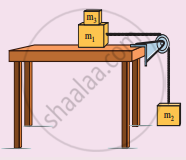Advertisements
Advertisements
Question
Two masses m1 and m2 are connected with a string passing over a frictionless pulley fixed at the comer of the table as shown in the figure. The coefficient of static friction of mass m1 with the table is µs Calculate the minimum mass m3 that may be placed on m1 to prevent it from sliding. Check if m1 = 15 kg, m2 = 10 kg, m3 = 25 and µs = 0.2.

Solution
Let m3 is the mass added on m1
Maximal static friction
`f_s^max` = µsN = µs (m1 + m3)g
Here,
N = (m1 + m3)g
Tension acting on string = T = m2 g
Equate (1) and (2)
µs(m1 + m3) = m2g
µsm1 + µsm3 = m2
m3 = `f_s^max` – m1
(ii) Given,
m1 = 15 kg, m2 = 10 kg : m3 = 25 kg and µs = 0.2
m3 = `f_s^max` – m1
m3 = `10/0.2` – 15 = 50 – 15 = 35 kg
The minimum mass m3 = 35 kg has to be placed on ml to prevent it from sliding. But here m3 = 25 kg only.
The combined masses (m1 + m3) will slide.
APPEARS IN
RELATED QUESTIONS
Explain various types of friction.
State the empirical laws of static and kinetic friction.
A long stick rests on the surface. A person standing 10 m away from the stick. With what minimum speed an object of mass 0.5 kg should he has thrown so that it hits the stick. (Assume the coefficient of kinetic friction is 0.7).
Briefly explain the origin of friction. Show that in an inclined plane, the angle of friction is equal to the angle of repose.
A heavy uniform chain lies on a horizontal table. If the coefficient of friction between the chain and the table is 0.25, then the maximum fraction of the length of the chain that can hang over one edge of the table is
If a body of mass m is moving on a rough horizontal surface of coefficient of kinetic friction µ, the net resultant force exerted by surface on the body is ______.
A 40 kg wooden crate is being pushed across a wooden floor with a force of 160 N. If µk = 0.3, the acceleration of the crate is ______ m/s2. (g = 10 m/s2}
A block of mass m is pulled by a constant power P placed on a rough horizontal plane. The friction co-efficient between the block and the surface is µ. Maximum velocity of the block will be:
A block of mass m = 1 kg moving on horizontal surface with speed u = 2 m/s enters a rough horizontal patch ranging from x = 0.10 m to x = 2.00 m. If the retarding force fr on the block in this range is inversely proportional to x over this range i.e.
fr = `"-k"/x` 0.10 < x < 2.00
= 0 for x < 0.10 and x > 2.00
If k = 0.5 J then the speed of this block as it crosses the patch is (use ℓn 20 = 3)
A body starts from rest on a long inclined plane of slope 45°. The coefficient of friction between the body and the plane varies as µ = 0.3 x, where x is distance travelled down the plane. The body will have maximum speed (for g = 10 m/s2) when x = ______.
